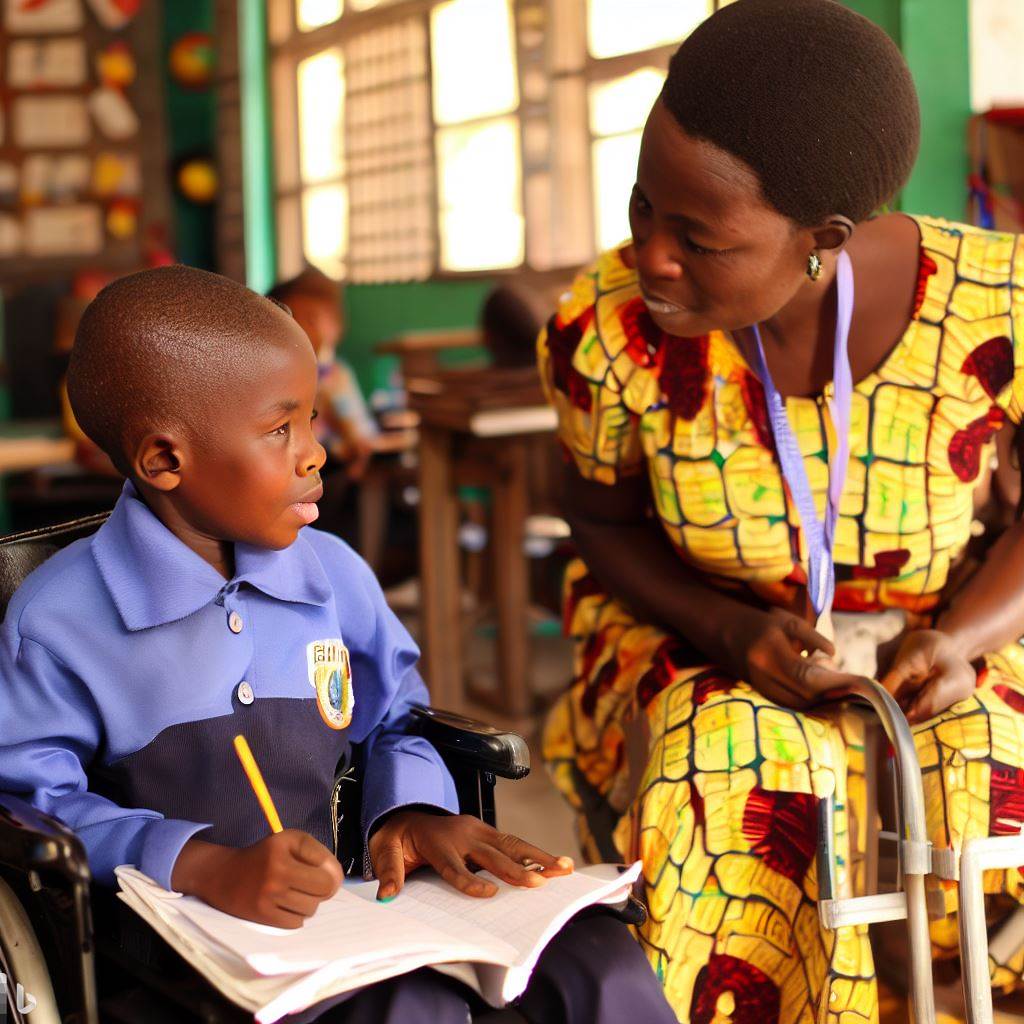Introduction
Special education is a form of education that caters to students with special needs. Special education is important in Nigeria as it ensures equal education opportunities for all.
The demand and supply gap of special education teachers in Nigeria refers to the shortage of qualified teachers in this field.
Significance of Special Education:
- Inclusive Learning: Provides tailored education to students with diverse learning needs, ensuring equal opportunities.
- Empowerment: Equips students with skills to lead independent, fulfilling lives, contributing to society.
Addressing the Demand-Supply Gap of Special Education Teachers:
- High Demand: Rising awareness increases the need for specialized educators to meet diverse learning requirements.
- Limited Supply: Few teachers possess the expertise, leading to a shortage of qualified special education professionals.
- Challenges: Inadequate training programs, lack of incentives, and misconceptions about special education deter teacher influx.
- Impact: The gap hampers quality education for students with disabilities, hindering their development and potential.
In summary, special education is vital for inclusive learning and empowerment in Nigeria.
The demand-supply gap of special education teachers underscores the pressing need for focused efforts to bridge this divide and ensure quality education for all.
Factors contributing to the demand and supply gap
The demand and supply gap of special education teachers in Nigeria can be attributed to several factors.
These factors contribute to the scarcity of qualified professionals in this field, making it harder to meet the educational needs of students with disabilities.
Lack of qualified teachers
One of the primary reasons for the demand and supply gap is the lack of qualified special education teachers.
Inadequate training and certification programs hinder the development of skilled professionals. Teachers often lack the necessary knowledge and skills to effectively support students with disabilities.
Furthermore, there is a reluctance among teachers to work in the special education field.
This may be due to the demanding nature of the job, including the need for patience, adaptability, and specialized teaching methods.
The lack of incentives and career development opportunities also contribute to the shortage of teachers in this field.
Read: A Comprehensive Overview of Special Education in Nigeria
Insufficient funding and resources
The limited budget allocated to special education programs in Nigeria is another significant factor contributing to the gap.
Insufficient financial support hampers the recruitment and retention of qualified special education teachers.
It becomes challenging to provide competitive salaries, benefits, and incentives to attract and retain professionals in this field.
Additionally, the lack of specialized teaching materials and technologies hinders effective instruction. Special education teachers require specific resources to cater to the diverse needs of their students.
Without adequate resources, it becomes difficult to create inclusive learning environments and provide personalized support.
Limited awareness and understanding of special education
Socio-cultural barriers contribute to the demand and supply gap of special education teachers.
Limited awareness and understanding of special education as a discipline lead to a lack of interest and investment in this field.
The societal perception of disabilities often perpetuates stigma and discrimination, further deterring individuals from pursuing a career in special education.
Moreover, the stigma and discrimination surrounding disabilities create obstacles for students and their families.
This discourages inclusive educational practices and prevents the full integration of students with disabilities into mainstream schools.
The lack of support and understanding from communities and educational institutions perpetuate the demand and supply gap.
In the end, the demand and supply gap of special education teachers in Nigeria is driven by various factors.
The lack of qualified teachers, insufficient funding and resources, and limited awareness and understanding of special education contribute to this gap.
Addressing these factors through improved training programs, increased funding, and awareness campaigns is crucial to bridge the gap and provide quality education for students with disabilities.
Read: Improving Special Education with Nigerian Government Policies
Consequences of the demand and supply gap
It is evident that the demand and supply gap of special education teachers in Nigeria has significant consequences on both the students and the education system as a whole.
The following are some of the major repercussions:
Overcrowded classrooms and increased student-teacher ratio
The shortage of special education teachers contributes to overcrowded classrooms and higher student-teacher ratios.
With a limited number of teachers available, the class sizes increase beyond manageable levels, making it challenging for educators to provide individualized attention and support.
The larger the class size, the more difficult it becomes for teachers to address the unique needs and learning styles of students with special needs.
This can severely hinder the progress and development of these students.
Inadequate individualized attention and support for students with special needs
The demand-supply gap significantly impacts the ability of special education teachers to provide individualized attention and support to students with special needs.
Due to the limited number of qualified teachers, they are stretched thin and unable to cater to the diverse range of learning requirements and disabilities.
Consequently, students may not receive the personalized assistance and resources they require to thrive academically and socially.
This lack of individualized attention can severely impede their progress and limit their overall educational experience.
Decline in the quality of special education services
The shortage of special education teachers inevitably leads to a decline in the quality of services provided.
Overworked teachers may struggle to maintain the high standards expected in special education due to increased workloads and limited resources.
This can result in a compromised learning environment and a lack of specialized interventions for students with disabilities.
As a consequence, students may not receive the comprehensive support they need to maximize their potential and achieve educational success.
Hindered educational development and opportunities for students with disabilities
Perhaps the most troubling consequence of the demand and supply gap is the hindered educational development and limited opportunities for students with disabilities.
With inadequate numbers of special education teachers, these students are deprived of the necessary skills, knowledge, and support to fully participate in society.
The lack of qualified professionals negatively impacts their ability to succeed academically, gain independence, and pursue meaningful careers.
This perpetuates a cycle of limited opportunities and exclusion, preventing students with disabilities from reaching their full potential.
In fact, the demand and supply gap of special education teachers in Nigeria has far-reaching consequences.
Overcrowded classrooms, inadequate attention and support, declining quality of services, and hindered educational development are among the many issues resulting from this gap.
Addressing this shortage is crucial to ensure an inclusive and empowering education system for students with special needs.
Read: Case Studies: Successful Special Education Teachers in Nigeria

Efforts and initiatives to address the demand and supply gap
These efforts and initiatives have been implemented to address the demand and supply gap of special education teachers in Nigeria.
Improvement of teacher training programs
By focusing on improving teacher training programs, the aim is to equip educators with the necessary skills and knowledge to effectively teach students with special needs.
Enhancing the curriculum for special education is essential in ensuring that teachers are equipped with the relevant pedagogical approaches and strategies to cater to the specific needs of their students.
By updating the curriculum, teachers can develop a deeper understanding of different disabilities and learn how to create inclusive learning environments.
Increased funding and allocation of resources
In addition to curriculum improvements, offering incentives is also crucial in attracting more individuals to pursue a career in special education.
Higher salaries and career development opportunities can motivate aspiring teachers to choose this path, helping to fill the demand and supply gap.
To further support the efforts, increased funding and resource allocation are necessary.
Government initiatives and policies can play a significant role in providing the essential financial backing needed to hire and retain special education teachers.
Collaboration with international organizations and NGOs can also bring additional resources, expertise, and support to bridge the gap.
Raising awareness and breaking stereotypes
Raising awareness is another key aspect. Advocacy campaigns can help to promote inclusive education and emphasize the importance of special education teachers in society.
By challenging stereotypes and misconceptions, more individuals may consider entering the field and contributing to meeting the demand for special education teachers.
Furthermore, dissemination of information and knowledge about special education is crucial.
By educating the general public about the benefits and significance of special education, more people may develop an interest in pursuing the field as a career.
Breaking down barriers and promoting a deeper understanding of special education can help attract more individuals to fill the demand and supply gap.
In short, efforts and initiatives to address the demand and supply gap of special education teachers in Nigeria revolve around improving teacher training programs, increasing funding and resource allocation, and raising awareness.
These actions are vital to ensure that students with special needs receive the education and support they deserve.
By implementing these measures, Nigeria can work towards reducing the gap and creating an inclusive education system for all.
Read: Building Inclusive Classrooms: The Nigerian Perspective
Success stories and potential solutions
In order to bridge the demand and supply gap of special education teachers in Nigeria, it is essential to highlight successful special education programs in the country.
By showcasing these success stories, it can inspire other schools and organizations to invest in special education and attract more teachers to the field.
Highlighting Successful special education programs in Nigeria
One success story that stands out is the “Open Doors Special Education Center.” This center has been operating for the past 10 years and has consistently produced outstanding results.
Their curriculum is tailored to meet the individual needs of students with special needs, focusing on their cognitive, physical, and emotional development.
With a dedicated team of well-trained special education teachers, the Open Dpprs Special Education Center has been able to provide quality education to a significant number of students with special needs in the local community.
Their success has encouraged other schools to replicate their program, ultimately increasing the number of special education teachers available.
Read: Insights into the Teaching Profession in Nigeria Today
Encouraging partnerships between schools and organizations
In addition to highlighting success stories, another potential solution is to encourage partnerships between schools and organizations.
Collaboration between schools and external organizations can help alleviate the shortage of special education teachers in Nigeria.
For example, schools can partner with NGOs or government agencies to create internship programs for aspiring special education teachers.
These partnerships can provide hands-on experience and training opportunities for individuals interested in special education.
By exposing them to the realities and challenges of the profession, it can attract more passionate individuals to join the field and reduce the demand and supply gap of special education teachers.
Establishing mentorship programs for special education teachers
Furthermore, establishing mentorship programs for special education teachers can also be an effective solution.
Experienced special education teachers can serve as mentors to new teachers, sharing their knowledge and expertise.
This mentorship can help support and guide new teachers, allowing them to develop their skills and confidence in the profession.
Mentorship programs can be implemented in schools or through professional associations.
New teachers can benefit from the wisdom and experience of their mentors, learning effective teaching techniques and strategies for accommodating students with special needs.
Overall, success stories and potential solutions play a crucial role in addressing the demand and supply gap of special education teachers in Nigeria.
Successful programs, partnerships, and mentorship foster interest, draw individuals, and provide quality education to special needs students.
Read: Resources and Support for Special Education Teachers in Nigeria
Conclusion
The demand and supply gap of special education teachers in Nigeria is a pressing issue. Addressing this gap is crucial for the improvement of the education system.
Stakeholders must actively collaborate and find sustainable solutions to bridge this gap.
Bridging the Gap:
- Supply Shortage: Lack of qualified teachers impedes quality special education delivery.
- Demand Surge: Growing awareness increases the need for specialized educators.
Advancing Education:
- Empowering Students: Equipped educators offer tailored support, unlocking potential for students with diverse needs.
- Inclusive Growth: Closing the gap fosters an inclusive education system, nurturing diverse talents.
- Stakeholder Unity: Government, institutions, and NGOs must collaborate for sustained solutions.
- Training Enhancement: Develop specialized training programs to equip educators for diverse classrooms.
Call to Action:
Collaborative efforts can transform the special education landscape, nurturing a brighter future for all students in Nigeria.




